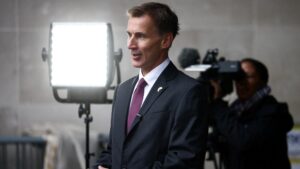Chancellor Jeremy Hunt has said that he is unsure if the government can afford further tax cuts – as a National Insurance (NI) reduction comes into force today.
The pre-election cut to NI, from 12% to 10%, will impact around 27 million payroll employees across the UK.
A person earning the UK’s average salary of £35,000 will save £450 a year, or £37.38 a month, as a result of this change.
Hunt said the reduction, announced in his Autumn Statement last year, means “that a typical family with two earners will be nearly a thousand pounds better off this year”.
But Labour argued this wasn’t true, saying frozen income tax and national insurance thresholds mean that many families have been drawn into higher tax bands.
The Opposition’s new attack ads criticising the policy even made it onto the Tory-supporting website Conservative Home on Friday.
Shadow chancellor Rachel Reeves said: “Under Rishi Sunak’s raw deal, for every extra £10 people are paying in tax they are only getting £2 back.”
In a statement on Saturday, Mr Hunt said he wanted to further ease the tax burden, which is expected to rise to the highest level since the Second World War before the end of this decade, but he doesn’t yet know if he can.
He called the NI reduction “the start of a process”, adding: “If I can afford to go further I will… I don’t yet know if I can. This is not the first time that Hunt has said that he might not be able to afford tax cuts to u-turn and announce further cuts within months.
“We want to do this because it helps families, it also helps to grow the economy, and we believe that a lightly taxed economy will grow faster and in the end that’ll mean more money for public services like the NHS.”
Mr Hunt argued the Conservative government “wants to bring down taxes” and recognises that “families are finding life really tough”.
But he defended its previous measures, saying: “It was right to support families through COVID and through the cost of living crisis, and yes taxes had to go up in that period.”
The government says its NI reduction is the biggest tax cut on record for workers.
The chancellor added: “Even after the effect of the tax rises that have happened previously, this means that a typical family will see their taxes go down next year.”
The clock is ticking for Mr Hunt to find the fiscal headroom to cut taxes again.
The spring budget, pencilled in for 6 March, will be the last chance for him to make major tax and spending promises before the election, which Mr Sunak has said will likely be in the second half of the year.
Following the Autumn Statement in November, the government has faced pressure from Tory MPs to go further and cut income tax or inheritance tax.
While many campaigners welcomed the National Insurance changes, they pointed out that the tax burden remains at record high levels for Britons – thanks in part to the threshold at which people start paying personal taxes being frozen, rather than rising with inflation.
Mr Sunak introduced the current tax freezes when he was chancellor back in 2021 and as prime minister, extended the time they would need to be in place, from 2026 to 2028.
This causes a so-called “fiscal drag” as pay goes up but tax thresholds don’t, so more people are dragged into higher tax brackets.
The Institute for Fiscal Studies has said the Autumn Statement gave back just £1 in tax cuts for every £4 of tax rises due to threshold freezes since 2021.
Ms Reeves claimed that despite the NI cut, the average family was paying £1,200 extra tax this year “because of choices by Rishi Sunak and this Conservative government”.
“Never have people paid so much in tax and got so little in return in the form of public services,” she said.
However, the Labour leadership has not committed to cutting tax or unfreezing the thresholds if they win the election.
Sir Keir Starmer has said that his priority is to grow the economy and he won’t make promises he can’t keep – but that he does want to “lower the burden of working people”.
Read more:
Hunt does not know if government can cut taxes again before election after NI reduction


























